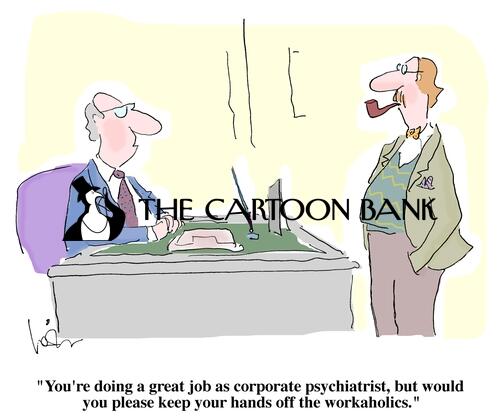Workaholism is the only addiction that society celebrates, especially employers. We reward people for psychologically and sometimes financially for showing up early, leaving late, taking one for the team, pulling an all-nighter, working through lunch, and for high levels of stress. Employers love it.
There are two sides to every coin, but this coin toss isn’t 50-50. On the surface, it seems like hiring workaholics is a great thing to do, but the hidden costs often outweigh the perceived benefit.
Here are the 3 reasons employers love workaholics as well as the flip side and hidden costs.

1. Workaholics (obviously) work a lot.
For employers who offer salaried versus hourly pay, the more hours a workaholic works, the less they are paying per hour for that employee. Workaholics tend to work more than 40 hours per week because they haven’t established boundaries between their personal and professional life. Salaried workers don’t earn overtime. They don’t earn more for working more. Workaholics think they’re earning their employer’s favor which may or may not be true. Employers love this.
The flip side: More hours doesn’t mean more value created. Workaholics spend a lot of time doing more busy work than doing business. Being busy is honorable in Corporate America. The busier you are (or look), the more important you are (or look). If you’re not busy, you’re not important. As a result, while workaholics may work a lot, they typically aren’t working on the thing that they are the best at doing that creates the most value for their employer. Workaholics become jacks-of-all-trades and masters of none. Workaholics will even create unnecessary work and to do list items just to look like they are doing something because we get anxious without activity.
2. Workaholics work hard and always give 110%.
Workaholics will always give you their best. Whatever is in their tank is dedicated to helping the company’s bank. Our competitive nature—whether we are competing with a colleague or another company—causes us to give everything we do 110%…of what we have. We have a hard time with prioritization, time management, and energy management. Our inner compulsion to compare, compete, and be busy make us view all work as good work. If we can also get the added “hit” of looking like a team player for working hard and late, we will take it.
The flip side: The problem with giving 110% is that it’s not sustainable and leads to burnout. You can never give more than what you actually have for an extended period of time. Employers assume that every hour of hard work leads to an equal amount of hard results. That’s not true. Value creation is the function of right effort and right action. Workaholics are always willing to give the effort, but whether it’s being directed toward the right activities is the big question. If you’re giving 110% to the wrong thing, you get 0 results. Even if you are doing the right thing, at some point the law of diminishing returns kicks in. More value is probably created between the hours of 10am-11am than 4pm-5pm simply because energy levels and attention tend to be higher earlier in the day and they deplete as the day goes on. Without adequate rest and renewal, workaholics end up burned out which negatively impacts productivity and retention.
3. Workaholics can’t say “No.”
Workaholics put the company first. Workaholics are addicted to work and companies are our drug dealers. Oftentimes, workaholics put their company ahead of their families and friends. Workaholics tend to be people pleasers. We don’t know how to say “No.” Workaholics are the go-to guys and gals, utility players, first responders, and brown nosers. We are the emergency contacts–always on call like a doctor. The boss can call, text, or email at anytime of day or night and we will be the first to respond and willing to do whatever the boss wants.
The flip side: Workaholics feel like superheroes in the moment, but ultimately we feel powerless to our employers. That powerlessness breads resentment. While work gives us our worth and it is our escape, we also know it is the source of our addiction and unhappiness. That’s a fragile line for employers and employees to walk. Employers end up building teams of yes-men and yes-women who have low energy and high frustration. Though it’s not the company’s fault that the workaholic is who they are, the company still gets the blame because workaholics tend to externalize the problem until we are able to look in the mirror and see that the true source is actually internal–whether it’s is our fear of not having enough, not being good, not fitting in enough, or not doing enough. Workaholics infect the company culture with their addiction. When a new team member comes on board, they notice the unspoken do-as-you’re-told culture and never-ending hours. That repels more talent than it attracts.
If a culture of workaholism is already prevalent, whatever results the company is getting now will not be sustainable. There is a difference between workaholism and high performance. Both look like hard work, but workaholism is hard work in unsustainable unhealthy ways, whereas high performance in hard work in healthy sustainable way.
High performers look forward to Monday while workaholics look forward to Friday. That’s why a company of high performers will always beat a company of workaholics in the long run. There are ways to shift a culture, but like any addiction, the employer has to admit they have a problem first.







